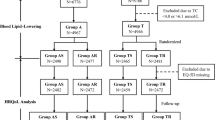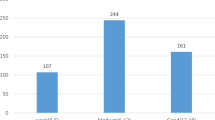Abstract
The relationship between adherence to antihypertension medications, treatment satisfaction and illness perception has not been studied so far. The primary objective of this study was to examine the association between adherence to medication, treatment satisfaction and illness perception in Lebanese hypertensive patients. The relation between medication adherence and blood pressure (BP) control was also assessed. In this cross-sectional study, patients were recruited from the physician’s practice offices and community pharmacies in Beirut. Patients who had been treated for hypertension for at least 3 months were invited to participate in the study; they completed three questionnaires: the 8-item Morisky Medication Adherence Scale (MMAS-8), the Treatment Satisfaction Questionnaire for Medication (TSQM-4) and the Brief Illness Perception Questionnaire (BIPQ). BP was also measured and recorded. A total of 117 subjects were included, of whom 29.1% had poor adherence to their antihypertension treatment (MMAS-8 scores<6). The odds of having well-controlled hypertension was 3.5 times higher in patients with high adherence compared with patients with poor adherence (P=0.010). Treatment satisfaction was significantly greater in patients with good adherence (P<0.001). Neither socio-demographic, disease- nor drug-related characteristics of the participants were significantly associated with medication adherence. As for illness perception, even though the mean BIPQ score of adherent participants was lower than the mean score of non-adherent participants, this difference did not reach statistical significance. In conclusion, treatment satisfaction was found to be a predictor of adherence. Studies are needed to determine whether interventions to increase satisfaction can improve adherence and BP control.
This is a preview of subscription content, access via your institution
Access options
Subscribe to this journal
Receive 12 digital issues and online access to articles
$119.00 per year
only $9.92 per issue
Buy this article
- Purchase on Springer Link
- Instant access to full article PDF
Prices may be subject to local taxes which are calculated during checkout
Similar content being viewed by others
References
Word Health Organization. A global brief on hypertension: Silent killer, global public health crisis 2013. http://www.who.int/cardiovascular_diseases/publications/global_brief_hypertension/en/ [Last assessed 21-1-2015].
Sakhuja A, Textor SC, Taler SJ . Uncontrolled hypertension by the 2014 evidence-based guideline: results from NHANES 2011-2012. J Hypertens 2015; 33: 644–652.
Morisky DE, Ang A, Krousel-Wood M, Ward HJ . Predictive validity of a medication adherence measure in an outpatient setting. J Clin Hypertens (Greenwich) 2008; 10: 348–354.
Florczak E, Tokarczyk B, Warchol-Celinska E, Szwench-Pietrasz E, Prejbisz A, Gosk M et al. Assessment of adherence to treatment in patients with true resistant hypertension using toxicological serum analysis - subgroup evaluation of the RESIST-POL study. Pol Arch Med Wewn 2015; 125 (1-2): 65–72.
Kang CD, Tsang PP, Li WT, Wang HH, Liu KQ, Griffiths SM et al. Determinants of medication adherence and blood pressure control among hypertensive patients in Hong Kong: A cross-sectional study. Int J Cardiol 2014; 182C: 250–257.
Villa L, Sun D, Denhaerynck K, Vancayzeele S, Brie H, Hermans C et al. Predicting blood pressure outcomes using single-item physician-administered measures: a retrospective pooled analysis of observational studies in Belgium. Br J Gen Pract 2015; 65: e9–e15.
Santschi V, Rodondi N, Bugnon O, Burnier M . Impact of electronic monitoring of drug adherence on blood pressure control in primary care: a cluster 12-month randomised controlled study. Eur J Intern Med 2008; 19: 427–434.
Ogedegbe GO, Boutin-Foster C, Wells MT, Allegrante JP, Isen AM, Jobe JB et al. A randomized controlled trial of positive-affect intervention and medication adherence in hypertensive African Americans. Arch Intern Med 2012; 172: 322–326.
Shikiar R, Rentz AM . Satisfaction with medication: an overview of conceptual, methodologic, and regulatory issues. Value Health 2004; 7: 204–215.
Hudak PL, Wright JG . The characteristics of patient satisfaction measures. Spine (Phila Pa 1976) 2000; 25: 3167–3177.
Knowles SR, Wilson JL, Connell WR, Kamm MA . Preliminary examination of the relations between disease activity, illness perceptions, coping strategies, and psychological morbidity in Crohn's disease guided by the common sense model of illness. Inflamm Bowel Dis 2011; 17: 2551–2557.
Ross S, Walker A, MacLeod MJ . Patient compliance in hypertension: role of illness perceptions and treatment beliefs. J Hum Hypertens 2004; 18: 607–613.
Fernandez-Arias M, Acuna-Villaorduna A, Miranda JJ, Diez-Canseco F, Malaga G . Adherence to pharmacotherapy and medication-related beliefs in patients with hypertension in Lima, Peru. PLoS ONE 2014; 9: e112875.
Lee GK, Wang HH, Liu KQ, Cheung Y, Morisky DE, Wong MC . Determinants of medication adherence to antihypertensive medications among a Chinese population using Morisky Medication Adherence Scale. PLoS ONE 2013; 8: e62775.
Odusola AO, Hendriks M, Schultsz C, Bolarinwa OA, Akande T, Osibogun A et al. Perceptions of inhibitors and facilitators for adhering to hypertension treatment among insured patients in rural Nigeria: a qualitative study. BMC Health Serv Res 2014; 14: 624.
Hypertension: Clinical management of primary hypertension in adults http://www.nice.org.uk/guidance/CG127 [Last assessed on Januray 14th, 2015].
Zyoud SH, Al-Jabi SW, Sweileh WM, Morisky DE . Relationship of treatment satisfaction to medication adherence: findings from a cross-sectional survey among hypertensive patients in Palestine. Health Qual Life Outcomes 2013; 11: 191.
Moise N, Schwartz J, Bring R, Shimbo D, Kronish IM . Antihypertensive drug class and adherence: an electronic monitoring study. Am J Hypertens 2014; 28 (6): 717–721.
Delestras S, Roustit M, Bedouch P, Minoves M, Dobremez V, Mazet R et al. Comparison between two generic questionnaires to assess satisfaction with medication in chronic diseases. PLoS ONE 2013; 8: e56247.
Luo N, Qi W, Zhuang C, Di W, Lu Y, Huang Z et al. A satisfaction survey of current medicines used for migraine therapy in China: is Chinese patent medicine effective compared with Western medicine for the acute treatment of migraine? Pain Med 2014; 15: 320–328.
Tang TS, Digby EM, Wright AM, Chan JH, Mazanderani AB, Ross SA et al. Real-time continuous glucose monitoring versus internet-based blood glucose monitoring in adults with type 2 diabetes: A study of treatment satisfaction. Diabetes Res Clin Pract 2014; 106: 481–486.
Riedel M, Schmitz M, Ostergaard PK, Ferrannini L, Franco MA, Alfano V et al. Comparison of the effects of quetiapine extended-release and quetiapine immediate-release on cognitive performance, sedation and patient satisfaction in patients with schizophrenia: A randomised, double-blind, crossover study (eXtRa). Schizophr Res 2015; 162 (1-3): 162–168.
Aljumah K, Ahmad Hassali A, AlQhatani S . Examining the relationship between adherence and satisfaction with antidepressant treatment. Neuropsychiatr Dis Treat 2014; 10: 1433–1438.
Rauck R, Parikh N, Dillaha L, Barker J, Stearns L . Patient satisfaction with fentanyl sublingual spray in opioid-tolerant patients with breakthrough cancer pain. Pain Pract 2014; 15 (6): 554–563.
Sweileh WM, Ihbesheh MS, Jarar IS, Taha AS, Sawalha AF, Zyoud SH et al. Self-reported medication adherence and treatment satisfaction in patients with epilepsy. Epilepsy Behav 2011; 21: 301–305.
Al-Jabi SW, Zyoud SH, Sweileh WM, Wildali AH, Saleem HM, Aysa HA et al. Relationship of treatment satisfaction to health-related quality of life: findings from a cross-sectional survey among hypertensive patients in Palestine. Health Expect e-pub ahead of print 7 December 2014.
Olszanecka-Glinianowicz M, Almgren-Rachtan A . The adherence and illness perception of patients diagnosed with asthma or chronic obstructive pulmonary disease treated with polytherapy using new generation Cyclohaler. Postepy Dermatol Alergol 2014; 31: 235–246.
Chen H, Rosenzweig EB, Gotzkowsky SK, Arneson C, Nelsen AC, Bourge RC . Treatment satisfaction is associated with improved quality of life in patients treated with inhaled treprostinil for pulmonary arterial hypertension. Health Qual Life Outcomes 2013; 11: 31.
Kepicoglu H, Hatipoglu E, Bulut I, Darici E, Hizli N, Kadioglu P . Impact of treatment satisfaction on quality of life of patients with acromegaly. Pituitary 2014; 17: 557–563.
Kim JW, Bosworth HB, Voils CI, Olsen M, Dudley T, Gribbin M et al. How well do clinic-based blood pressure measurements agree with the mercury standard? J Gen Intern Med 2005; 20: 647–649.
Shi L, Liu J, Koleva Y, Fonseca V, Kalsekar A, Pawaskar M . Concordance of adherence measurement using self-reported adherence questionnaires and medication monitoring devices. Pharmacoeconomics 2010; 28: 1097–1107.
Bowling A, Rowe G, Lambert N, Waddington M, Mahtani KR, Kenten C et al. The measurement of patients' expectations for health care: a review and psychometric testing of a measure of patients' expectations. Health Technol Assess 2012; 16, i-xii 1–509.
Spahr CD, Flugstad NA, Brousseau DC . The impact of a brief expectation survey on parental satisfaction in the pediatric emergency department. Acad Emerg Med 2006; 13: 1280–1287.
Author information
Authors and Affiliations
Corresponding author
Ethics declarations
Competing interests
The authors declare no conflict of interest.
Rights and permissions
About this article
Cite this article
Saarti, S., Hajj, A., Karam, L. et al. Association between adherence, treatment satisfaction and illness perception in hypertensive patients. J Hum Hypertens 30, 341–345 (2016). https://doi.org/10.1038/jhh.2015.86
Received:
Revised:
Accepted:
Published:
Issue Date:
DOI: https://doi.org/10.1038/jhh.2015.86
This article is cited by
-
Psychometric evaluation of a culturally adapted illness perception questionnaire for African Americans with type 2 diabetes
BMC Public Health (2022)
-
Treatment adherence to pegvisomant in patients with acromegaly in Spain: PEGASO study
Pituitary (2019)
-
Occupational burnout and empathy influence blood pressure control in primary care physicians
BMC Family Practice (2017)
-
Assessment of patients’ knowledge and practices regarding their medication use and risks in Lebanon
International Journal of Clinical Pharmacy (2017)
-
Illness perceptions of gout patients and the use of allopurinol in primary care: baseline findings from a prospective cohort study
BMC Musculoskeletal Disorders (2016)



